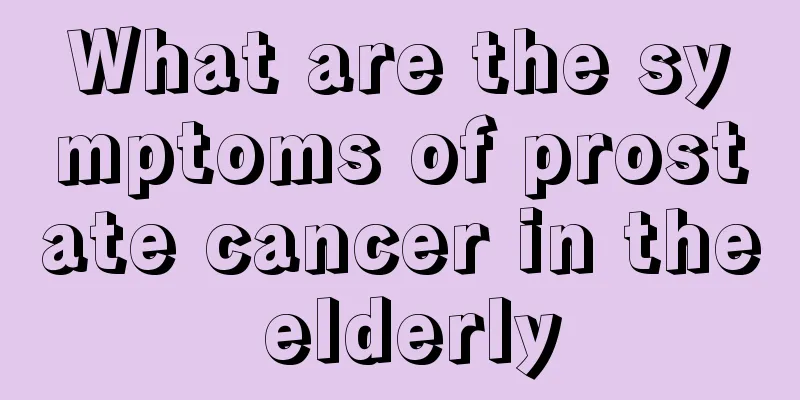What are the symptoms of prostate cancer in the elderly

|
For men, the older they get, the more susceptible they are to various diseases, especially prostate disease, which is the most common among the elderly. Prostate diseases can be benign or malignant. Among them, prostate cancer is a malignant tumor that seriously threatens the health of the elderly. Elderly friends should pay attention to its symptoms so that they can be discovered and treated in time. So what are the symptoms of prostate cancer in the elderly? Let's learn about it together. Symptoms of prostate cancer in the elderly may include: 1. Urinary disorders. When elderly people suffer from prostate cancer, they may experience difficulty urinating and abnormal urination, such as a thinner or skewed urine stream. Some may also present with bifurcated urine streams and prolonged urination. There may also be symptoms such as frequent urination, urgency, pain, and a feeling of incomplete urination. Severe prostate cancer may also lead to dripping urine and urine retention. 2. Pain. When an elderly person is diagnosed with prostate cancer, he or she may experience pain in many parts of the body, such as pain in the waist, sacrum, buttocks, and hips. Pelvic and sciatica are the most common, which can cause severe and unbearable pain. 3. Metastasis symptoms. Prostate cancer can cause metastasis. One-third to two-thirds of patients will have lymph node metastasis when they first visit the doctor. Generally, metastasis occurs in the internal iliac, external iliac, waist, groin and other parts. When metastasis occurs, it can cause enlargement of lymph nodes in the corresponding parts and swelling of the lower limbs. 4. Systemic symptoms. Prostate cancer can cause pain, which can have a great impact on the patient's eating, sleeping and mental state. Long-term suffering from pain can cause the patient's systemic condition to become increasingly weak, resulting in symptoms such as weight loss, fatigue, progressive anemia, cachexia or renal failure. What are the symptoms of prostate cancer in the elderly? The above are some possible symptoms of prostate cancer. Depending on the course of the disease, its symptoms will become more and more severe, causing greater pain to the patient. Therefore, it is important for the elderly to pay attention to regular physical examinations in order to detect the disease in time and treat it in time to avoid prostate cancer from developing to the late stage and causing greater harm. |
<<: Ways to stay away from prostate cancer: Eat a light diet
>>: What should prostate cancer patients eat
Recommend
How to improve the survival of patients with rectal cancer?
Rectal cancer is a common malignant tumor in the ...
Sacral chordoma symptoms
Sacral chordoma is a type of tumor that occurs fr...
What is the life-saving bloodletting method for stroke?
Stroke is a common disease that is prone to occur...
What is missing when the mouth corners are covered with bubbles? This deficiency is the most common
Blisters at the corners of the mouth may be due t...
What examinations and preparations are needed for cervical cancer detection? These are essential
The strategy of focusing on prevention as the mai...
What is the probability of rectal cancer being inherited? Will rectal cancer be inherited in people over 80?
Rectal cancer is a well-known cancer. People arou...
Differential diagnosis of central jaw cancer
What are the differential diagnoses of central ma...
Can I take Xiaoyanling if I have gastric erosion?
Normally, people's stomachs and intestines ne...
How long will it take to give birth if the contractions are every 6 minutes?
Before a pregnant woman gives birth, her cervix w...
Patients with cardia cancer will have symptoms of swallowing stagnation in the early stage
In fact, the early symptoms of cardia cancer are ...
What are the examination items for triple positive?
Hepatitis B is a very terrible infectious disease...
When do Fujian mangoes ripen
Mango is a tropical fruit and there are mango pro...
How to detect and control indoor formaldehyde?
After a house is newly renovated, it will cause p...
The most taboo thing in love, men should know these
The gender ratio in today's society is seriou...
Methods for detoxification and acne removal
Many people know that acne on the face may be cau...









